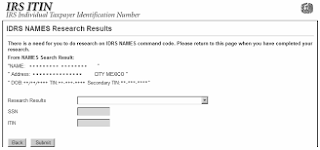In IR-2019-118 the IRS stated that nearly 2 million Individual Taxpayer Identification Numbers (ITINs) are set to expire at the end of 2019 as the Internal Revenue Service continues to urge affected taxpayers to submit their renewal applications early to avoid refund delays next year.
“We urge taxpayers with expiring ITINs to take action
and renew the number as soon as possible.
Renewing before the end of the year will avoid unnecessary delays related to their refunds,” said IRS Commissioner Chuck Rettig. “To help with this process, the IRS is sharing this material in multiple languages. We encourage partner groups to share this important information to reach as many people with ITINs as possible.”
Under the Protecting Americans from Tax Hikes (PATH) Act, ITINs that have not been used on a federal tax return at least once in the last three consecutive years
will expire Dec. 31, 2019.
In addition, ITINs with middle digits 83, 84, 85, 86 or 87 that have not already been renewed will also expire at the end of the year. These affected taxpayers who expect to file a tax return in 2020 must submit a renewal application as soon as possible.
ITINs are used by people who have tax filing or payment obligations under U.S. law but who are not eligible for a Social Security number. ITIN holders who have questions should visit the ITIN information page on IRS.gov and take a few minutes to understand the guidelines.
The IRS continues a nationwide education effort to share information with ITIN holders. To help taxpayers, the IRS offers a variety of informational materials, including flyers and fact sheets, available in several languages, including English, Spanish, Traditional Chinese, Russian, Vietnamese, Korean and Haitian/Creole on IRS.gov.
Who should renew an ITIN
- Taxpayers whose ITIN is expiring and who expect to have a filing requirement in 2020 must submit a renewal application. Others do not need to take any action. ITINs with the middle digits 83, 84, 85 or 86, 87 (For example: 9NN-83-NNNN) need to be renewed even if the taxpayer has used it in the last three years. The IRS will begin sending the CP-48 Notice, You must renew your Individual Taxpayer Identification Number (ITIN) to file your U.S. tax return, in early summer to affected taxpayers. The notice explains the steps to take to renew the ITIN if it will be included on a U.S. tax return filed in 2020. Taxpayers who receive the notice after acting to renew their ITIN do not need to take further action unless another family member is affected.
- ITINs with middle digits of 70 through 82 have previously expired. Taxpayers with these ITINs can still renew at any time, if they have not renewed already.
Family option remains available
Taxpayers with an ITIN that has middle digits 83, 84, 85, 86 or 87, as well as all previously expired ITINs, have the option to renew ITINs for their entire family at the same time. Those who have received a renewal letter from the IRS can choose to renew the family’s ITINs together, even if family members have an ITIN with middle digits that have not been identified for expiration. Family members include the tax filer, spouse and any dependents claimed on the tax return.
How to renew an ITIN
To renew an ITIN, a taxpayer must complete a Form W-7 and submit all required documentation. Taxpayers submitting a Form W-7 to renew their ITIN are not required to attach a federal tax return. However, taxpayers must still note a reason for needing an ITIN on the Form W-7. See the Form W-7 instructions for detailed information.
Spouses and dependents residing outside of the U.S. only need to renew their ITIN if filing an individual tax return, or if they qualify for an allowable tax benefit (e.g., a dependent parent who qualifies the primary taxpayer to claim head of household filing status.) In these instances, a federal return must be attached to the Form W-7 renewal application.
There are three ways to submit the Form W-7 application package. Taxpayers can:
- Mail the form, along with original identification documents or copies certified by the agency that issued them, to the IRS address listed on the Form W-7 instructions. The IRS will review the identification documents and return them within 60 days.
- Work with Certified Acceptance Agents (CAAs) authorized by the IRS to help taxpayers apply for an ITIN. CAAs can authenticate all identification documents for primary and secondary taxpayers, verify that an ITIN application is correct before submitting it to the IRS for processing and authenticate the passports and birth certificates for dependents. This saves taxpayers from mailing original documents to the IRS.
- In advance, call and make an appointment at a designated IRS Taxpayer Assistance Center to have each applicant’s identity authenticated in person instead of mailing original identification documents to the IRS. Each family member applying for an ITIN or renewal must be present at the appointment and must have a completed Form W-7 and required identification documents. See the TAC ITIN authentication page for more details.
Avoid common errors now and prevent delays next year
Federal tax returns that are submitted in 2020 with an expired ITIN will be processed. However, certain tax credits and any exemptions will be disallowed. Taxpayers will receive a notice in the mail advising them of the change to their tax return and their need to renew their ITIN. Once the ITIN is renewed, applicable credits and exemptions will be restored, and any refunds will be issued.
Additionally, several common errors can slow down some ITIN renewal applications. These mistakes generally center on:
- mailing identification documentation without a Form W-7,
- missing information on the Form W-7, or
- insufficient supporting documentation, such as U.S. residency documentation or official documentation to support name changes.
The IRS urges any applicant to check over their form carefully before sending it to the IRS.
As a reminder, the IRS no longer accepts passports that do not have a date of entry into the U.S. as a stand-alone identification document for dependents from a country other than Canada or Mexico, or dependents of U.S. military personnel overseas. The dependent’s passport must have a date of entry stamp, otherwise the following additional documents to prove U.S. residency are required:
- U.S. medical records for dependents under age 6,
- U.S. school records for dependents under age 18, and
- U.S. school records (if a student), rental statements, bank statements or utility bills listing the applicant’s name and U.S. address, if over age 18.
Have a IRS Tax Problem?

Contact the Tax Lawyers at
Marini& Associates, P.A.
for a FREE Tax HELP Contact Us at:
orToll Free at 888-8TaxAid (888) 882-9243











